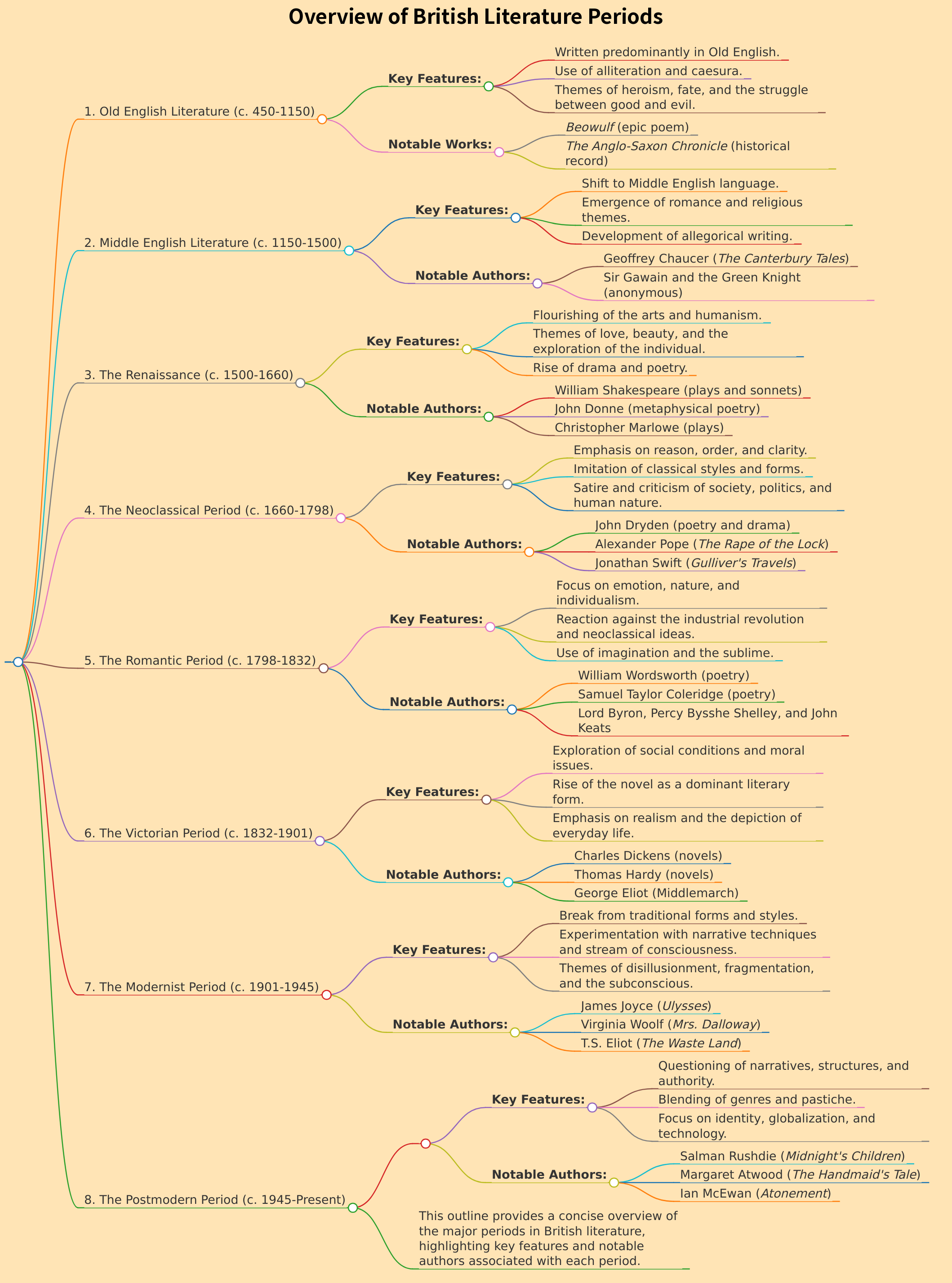
# Overview of British Literature Periods
- British literature can be broadly categorized into several key periods, each with its distinct characteristics, themes, and notable authors. Below is a summary of the major literary periods in British literature:
## 1. Old English Literature (c. 450-1150)
- **Key Features:**
- Written predominantly in Old English.
- Use of alliteration and caesura.
- Themes of heroism, fate, and the struggle between good and evil.
- **Notable Works:**
- *Beowulf* (epic poem)
- *The Anglo-Saxon Chronicle* (historical record)
## 2. Middle English Literature (c. 1150-1500)
- **Key Features:**
- Shift to Middle English language.
- Emergence of romance and religious themes.
- Development of allegorical writing.
- **Notable Authors:**
- Geoffrey Chaucer (*The Canterbury Tales*)
- Sir Gawain and the Green Knight (anonymous)
## 3. The Renaissance (c. 1500-1660)
- **Key Features:**
- Flourishing of the arts and humanism.
- Themes of love, beauty, and the exploration of the individual.
- Rise of drama and poetry.
- **Notable Authors:**
- William Shakespeare (plays and sonnets)
- John Donne (metaphysical poetry)
- Christopher Marlowe (plays)
## 4. The Neoclassical Period (c. 1660-1798)
- **Key Features:**
- Emphasis on reason, order, and clarity.
- Imitation of classical styles and forms.
- Satire and criticism of society, politics, and human nature.
- **Notable Authors:**
- John Dryden (poetry and drama)
- Alexander Pope (*The Rape of the Lock*)
- Jonathan Swift (*Gulliver's Travels*)
## 5. The Romantic Period (c. 1798-1832)
- **Key Features:**
- Focus on emotion, nature, and individualism.
- Reaction against the industrial revolution and neoclassical ideas.
- Use of imagination and the sublime.
- **Notable Authors:**
- William Wordsworth (poetry)
- Samuel Taylor Coleridge (poetry)
- Lord Byron, Percy Bysshe Shelley, and John Keats
## 6. The Victorian Period (c. 1832-1901)
- **Key Features:**
- Exploration of social conditions and moral issues.
- Rise of the novel as a dominant literary form.
- Emphasis on realism and the depiction of everyday life.
- **Notable Authors:**
- Charles Dickens (novels)
- Thomas Hardy (novels)
- George Eliot (Middlemarch)
## 7. The Modernist Period (c. 1901-1945)
- **Key Features:**
- Break from traditional forms and styles.
- Experimentation with narrative techniques and stream of consciousness.
- Themes of disillusionment, fragmentation, and the subconscious.
- **Notable Authors:**
- James Joyce (*Ulysses*)
- Virginia Woolf (*Mrs. Dalloway*)
- T.S. Eliot (*The Waste Land*)
## 8. The Postmodern Period (c. 1945-Present)
- **Key Features:**
- Questioning of narratives, structures, and authority.
- Blending of genres and pastiche.
- Focus on identity, globalization, and technology.
- **Notable Authors:**
- Salman Rushdie (*Midnight's Children*)
- Margaret Atwood (*The Handmaid's Tale*)
- Ian McEwan (*Atonement*)
---
- This outline provides a concise overview of the major periods in British literature, highlighting key features and notable authors associated with each period.
复制内容
下载markdown文件
在线编辑